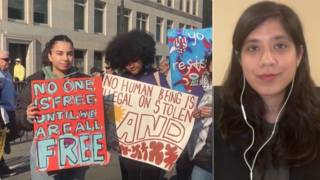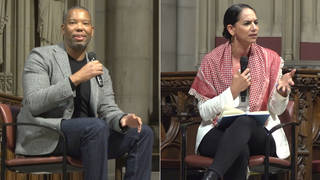
Related
Topics
Guests
- Laura Moyedeputy director of the Southern region at Amnesty International USA.
- Ezekiel Edwardsstaff attorney at the Innocence Project who specializes in eyewitness evidence.
Georgia death row prisoner Troy Anthony Davis is scheduled to be executed Monday night. Earlier this month, the Supreme Court refused to hear Davis’s appeal to have a jury hear new evidence that he says could prove his innocence. Lawyers have asked the 11th Circuit Court of Appeals to stay his execution and allow them to file a new federal lawsuit based on innocence claims. We speak to Ezekiel Edwards of the Innocence Project and Laura Moye of Amnesty International USA. [includes rush transcript]
Transcript
JUAN GONZALEZ: Georgia death row prisoner Troy Anthony Davis is scheduled to be executed Monday night at 7:00 p.m. Earlier this month, the Supreme Court refused to hear Davis’s appeal to have a jury hear new evidence that he says could prove his innocence. The court gave no explanation for its decision not to hear Davis’s case. Last month, the court granted him a last-minute reprieve two hours before he was scheduled to be executed.
Troy Anthony Davis was given the death sentence for the 1989 killing of a white police officer. Since that trial, seven of the nine non-police witnesses have recanted their testimony, and there is no direct physical evidence tying Davis to the crime scene.
Davis’s lawyers asked the 11th Circuit Court of Appeals Wednesday to stay his execution and allow them to file a new federal lawsuit based on innocence claims. The motion reads, “Society recoils at state execution of an innocent person,” and notes that executing Davis in light of new evidence regarding his innocence is “constitutionally intolerable.”
AMY GOODMAN: We’re joined now by two guests. Ezekiel Edwards is a staff attorney at the Innocence Project here in New York, specializing in eyewitness evidence. Laura Moye is on the phone with us. She’s deputy director of the Southern region of Amnesty International USA. She’s joining us from Atlanta, Georgia, where hundreds demonstrated on Thursday, the global day of action for Troy Davis.
I want to begin with Laura Moye in Georgia. Tell us what the lawyers are doing right now. What we’ve seen most recently is Troy Davis has had two dates to die. The last one, he was within two hours of being executed when the Supreme Court stopped that execution. But now, they will not accept an appeal of the case, and Georgia is scheduled to kill him on Monday. Laura?
LAURA MOYE: Right. Well, his legal team has filed a motion with the 11th Circuit. And meanwhile, on the ground, we have a lot of activism planned for today and all the way up to Monday at 7:00, if we don’t have an intervention by then.
But one of the things that’s also available to him, too, is that the parole board in Georgia has executive clemency power. In most states, it’s the governor, not the parole board. But we are continuing to ask the parole board to reconsider their decision. We’re appealing also to our governor, who doesn’t have direct power, but we think he should be concerned about the reputation of our state and the confidence that will be totally lost by the citizens of Georgia should there not be an intervention before Monday at 7:00 p.m..
JUAN GONZALEZ: Has the parole board acted in the past in any capital case?
LAURA MOYE: Yes, they have. In fact, earlier this year, there was a man named David Crowe who was — he had his sentence commuted by the parole board.
AMY GOODMAN: And explain the grounds on which — I mean, this has already gone to the Supreme Court. How are the lawyers trying to appeal this?
LAURA MOYE: Well, as Juan was just announcing, the idea is that they’re appealing to the idea that it should be unconstitutional that an innocent person could be executed. So it’s a similar argument to the ones that they have been making all along.
AMY GOODMAN: Ezekiel Edwards, let’s talk about this issue of innocence, when innocence matters, when it doesn’t, and the eyewitness testimony on which this case is based.
EZEKIEL EDWARDS: Well, just for a little bit of background, since the Innocence Project was founded in 1992 by Barry Scheck and Peter Newfeld, 223 people have been exonerated through post-conviction DNA testing. We’ve looked back at those cases and found that in 75 percent of them, mistaken eyewitness identification was a leading contributing factor.
Troy Davis’s case was based almost entirely on identification evidence. As you said earlier, of the seven witnesses who came to court — well, the nine witnesses, but five of whom were eyewitnesses — seven were eyewitnesses; five have recanted their testimony. Seven of the nine total witnesses have recanted their testimony.
There has been now thirty years of copious social science research looking at the factors that affect reliability of eyewitness evidence. Troy Davis’s case presents many of those factors, both in terms of what actually happened during the incident and the witnesses’ opportunity to view and also the procedures that the police used, all of which contravened best practices.
What’s outrageous is that, first of all, his defense lawyer actually didn’t even try to suppress the eyewitness identification evidence at trial. He didn’t ask that it not go to the jury. When it did go to the jury, he didn’t ask for an expert to tell the jury what those factors were. He didn’t ask for special jury instructions. And what’s also outrageous is that not one of these witnesses has been heard in a court of law, not in Georgia, not by the Supreme Court. And so, you’ve got somebody who has a compelling case of innocence with seven people coming forward and saying that they didn’t tell the truth at trial, and no court has bothered to hear those witnesses.
JUAN GONZALEZ: And why is eyewitness testimony so unreliable?
EZEKIEL EDWARDS: Well, there are a few reasons. First of all, just the way that the human memory works. And there’s been many studies. I mean, there have been psychologists from Hugo Munsterberg a hundred years ago to Supreme Court justices in the late ’60s, who have been talking about the fragility of such evidence. When somebody sees an incident, the way that you encode it, the way that you then preserve it and the way you retrieve it, there’s all of these opportunities for contamination along the way.
In Troy’s case, the — for instance, the incident happened at night. It happened very quickly. There was a weapon present, so that would have been stressful and distracting for the witnesses. On top of that, when the police conducted their identification procedures, it was the same officer doing all of them, and he knew who the suspect was — Troy Davis — and he knew that that’s who they wanted the witness to pick.
But even more egregiously, every single witness who identified Troy Davis at trial, who have now said that they lied, had seen a picture of Troy Davis prior to the lineup procedure, inclusive of his photo. Some had seen it on wanted posters. Some had seen it on the media. Some had seen it in the possession of the police. And then they were asked, in very suggestive circumstances, who did this? Now they’re saying, in fact, they really didn’t see who did it.
AMY GOODMAN: And some are saying that it’s someone else who pointed the finger at Troy.
EZEKIEL EDWARDS: Yeah. Adding to the outrage of this case is that one of the nine witnesses, who has not recanted — there are only two. I’m sorry, one of the nine witnesses — two have not recanted — is a guy named Red Coles. And he is now suspected to be the shooter. In fact, at least five witnesses — I heard actually as many as nine — have now said that they either saw him do the shooting or that he —-
AMY GOODMAN: Red Coles.
EZEKIEL EDWARDS: Red Coles -— or that he confessed to them, including a family member and two good friends. No court has heard from those witnesses, either. So they haven’t heard from the recanting witnesses, and they haven’t heard from the witnesses pointing the finger —-
AMY GOODMAN: And what does Red Coles say? And where is he?
EZEKIEL EDWARDS: I don’t know where he is. He certainly hasn’t -—
LAURA MOYE: Red Coles is alive —-
EZEKIEL EDWARDS: Sorry. If she has…
AMY GOODMAN: Go ahead.
LAURA MOYE: I’m sorry. Red Coles lives in Savannah. He’s alive and well. And he -— as you said, he was implicated by at least nine people in sworn affidavits. Some people said that he’s bragged that he killed the police officer. And it’s interesting that Red Coles is the person who pointed the police to Troy Davis as the leading suspect. And from there, they built a case that it was Troy Davis. They did not cast a wide net to consider alternative suspects, including this man, Sylvester Coles, who had a motive himself to have shot the police officer.
AMY GOODMAN: And the motive was what?
LAURA MOYE: Well, the police officer, you know, was coming to the scene of the crime to — somebody had attacked this homeless man. And if you take the theory that Sylvester Coles was the person who committed that act, you know, he was trying to keep out of trouble. So, I mean, there’s a very strong theory that there is this alternative suspect, and the police didn’t really search that out, and the courts aren’t willing to hear it.
JUAN GONZALEZ: And, Laura Moye, is your sense that part of the resistance to actually reopen this case is the reality that the prosecutorial misconduct and the police misconduct would also come on trial, as well?
LAURA MOYE: Well, that’s very possible. I mean, the system and the folks involved have a lot to lose. If it comes out, you know, that there was a police or prosecutorial misconduct, it really does not look good for them.
AMY GOODMAN: Ezekiel Edwards?
EZEKIEL EDWARDS: Well, I’d just add two things. One is that there was a lot of pressure put on these witnesses. They’ve all come forward and said that they were — the police and prosecutors exerted immense pressure on them. And so, I’m sure they don’t —-
LAURA MOYE: And they’ve been threatened with perjury. And this alternative suspect has threatened some of them, too, as has been alleged.
EZEKIEL EDWARDS: And I also want to make the point that we’re not even asking -— like, right now, Troy —- it’s not even about a new trial. He’s been denied even a hearing, where these witnesses can come forward to try to get a new trial. So, no -—
AMY GOODMAN: Why would the Supreme Court stop this? I mean, he was within two hours of being executed, and the Supreme Court stopped it and then moved forward. Why did they bother to stop it?
LAURA MOYE: That’s not —-
AMY GOODMAN: Laura?
LAURA MOYE: That’s not so unusual, because the county where Davis was convicted and sent to death row, Chatham County -— that’s Savannah — that —- the judge of the superior court there issued an execution warrant to have Troy executed a week before the US Supreme Court came back to session in September. So I think the US Supreme Court said, “You know, give us at least a week to come back and consider the cert petition” that was filed with them over the summer. So the folks down in Chatham County are very anxious to get this execution done and over with. I think the US Supreme Court felt, especially with all the attention, I’m sure, that, you know, give us at least a week to come back to session and consider the cert petition.
EZEKIEL EDWARDS: But the Supreme Court didn’t actually explain why they didn’t take the case. They simply didn’t. And in addition to the fact that this is a very disturbing move by the Supreme Court, obviously, for Troy Davis and for our criminal justice system, they were also rejecting to hear the decision by the Georgia Supreme Court, a four-to-three decision, that basically said if you have recantation testimony, if you have people who have come forward now and said, “Actually, at trial, I was lying,” unless you can pretty much absolutely prove that what they were saying at trial was false, like they had been convicted of perjury since then or they were in another state and you can prove it, that that testimony is not enough to get you a new hearing. So that has reverberations for many people in the state of Georgia, not just Troy Davis.
AMY GOODMAN: Laura Moye, we have ten seconds. What are people doing right now? What are you suggesting people do?
LAURA MOYE: Well, people should go to the website amnestyusa.org, and you can still send your letter to the parole board. It’ll be copied to the governor. We’re going to have a funeral procession planned in a couple hours. We’re going to be delivering a casket with the word “justice” on it. We’re going to be delivering over 140,000 petitions to the parole board. There are people who are writing letters to the doctors who were involved. Georgians for Alternatives to the Death Penalty [inaudible] -—
AMY GOODMAN: We’re going to have to leave it there. Laura Moye of Amnesty International, Ezekiel Edwards of the Innocence Project, thanks so much.












Media Options